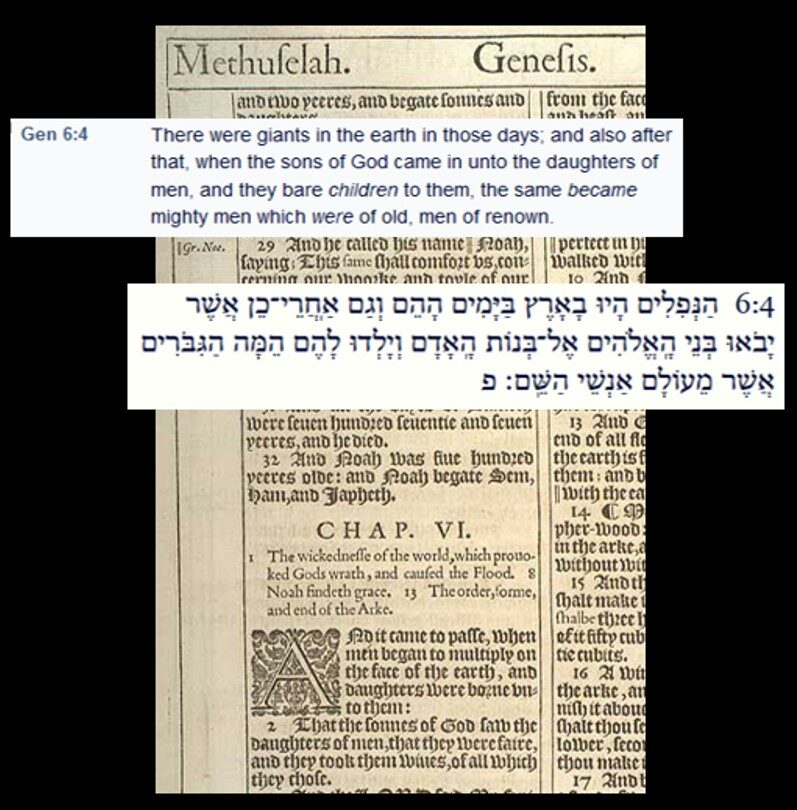Yehuda Shurpin, of the Jewish group Chabad, wrote an interesting article titled, Nephilim: Fallen Angels, Giants or Men? The mystery of Genesis 6:1-4.
After a short intro and quoting the relevant Genesis text, he notes:
One thing benei elokim [aka elohim] does not mean is “sons of G d.” In fact, Rabbi Shimon bar Yochai would “curse” anyone who translated the term benei elokim as the “sons of G d”…Nephilim seems to be derived from the verb-root naphal, meaning “fall.”
A footnote at this point cites the rabbi’s statement to Midrash Genesis Rabbah 26:5. Yehuda Shurpin notes that the rabbis claimed that “benei elokim means judges. However, his cursing those who translate it as ‘sons of G d’ is not meant in reference to the opinion that they are angels, for (a) this opinion is found in many places in the works of the sages, including the Talmud, so it does not seem probable that he would curse those who hold so widely accepted an opinion (see footnote 5 [which simply reads, “Psalms 8:5”]); (b) the Zohar [see my Zohar on the nephilim] (1:37a) quotes this explanation without any negative comments.”

Shurpin continues thusly:
The word elokim in Scripture, while generally referring to G d, is in essence merely an expression of authority. Similarly, the term benei does not necessarily mean “sons,” but is often just a title. Benei chorin, for example, means those who are free—not “sons of freedom.”
Indeed, elokim does not “mean ‘God’” as some may think and as for benei “not necessarily mean ‘sons,’” indeed, the Angelic view of Genesis 6 is that it is “just a title” as in the metaphorical example of “sons of freedom” since the claim is not that God somehow birthed the Angels but that they are titularly, metaphorically, his “sons” as they are a direct creation of God.
It is noted that the view that “the generation of the Flood went astray” in general is related in the Babylonian Talmud (aka Talmud Bavli) Yoma 67b, in Targum Yonatan (aka Johnathan) ben Uziel to Genesis 6:4, in Pirkei d’Rabbi Eliezer 22, in Zohar 1:37a, and Yalkut Shimoni, Bereishith, remez 44. Thus, the issue is details: who are the sons of God, daughters of men, Nephilim and Gibborim?
Shurpin relates that within the relevant Midrash two angels are named: Shamchazai and Azael which the Talmud’s Yoma 67b counts as being three Shamhazzai (same as the Midrash but with a different transliteration), Uzza and Uzziel (perhaps a variation of Azael which is aka Azazel).
It is related that they complain to God with words related to Psalms 8:4-5, “What is man, that thou art mindful of him? and the son of man, that thou visitest him? For thou hast made him a little lower than the angels, and hast crowned him with glory and honour” (which Hebrews 2:7 applies to Jesus).
To make a long, folkloric, story short: the Angels are dispatched to Earth and end up falling for human women thus the Genesis 6 affair. See Louis Ginzberg’s The Legends of the Jews on the Nephilim and Islam’s magickian fallen angels Harut and Marut.
Yehuda Shurpin then makes a sadly typical statement of sorts to the effect of that which is a “fact…in Judaism” which is that “there is no such thing as fallen angels or conflict in heaven…Even ‘Satan’ is merely the name of an angel whose divinely assigned task is to tempt people to sin.”
There is some accuracy to this (see the book of Job for example) yet, to authoritatively assert that which is a “fact…in Judaism” is just that; an authoritatively assertion. Think, for example, even just the difference between the Bible’s Judaism versus Rabbinic Judaism. The Bible’s Judaism has a priesthood while Rabbinic Judaism has a rabbinate. As per the Bible (see Numbers if nothing else) a Jew is one born to a Jewish father yet, as per Rabbinic Judaism a Jew is one born to a Jewish mother. Another immediately relevant example is that to back his claim about Satan, Shurpin does not cite the Bible but cites “Talmud, Bava Batra 16a.” As per Ezekiel 28:14, Satan is a Cherub and not an Angel.
The Bible claims that God is sovereign over all and Satan is certainly no match whatsoever; only in his twisted delusion could he consider himself to be a match. The being in question is known by many titled, two of which are Satan which means adversary and Devil which means accuser: he is an adversary and accuser of humanity (for example, see Zechariah 3:1 and Revelation 12:10 for examples).
Shurpin notes
Based on a more literal translation of benei elokim, many explain that the term is simply referring to princes, noblemen or judges who abused their power, raping anyone they fancied, and forcing any women who got married to have relations with them first.
A footnote dichotomizes sons of God and Angels plus giants as on the view proposed “benei elokim is understood to refer to princes, noblemen and judges, the term nephilim may very well still be referring to angels and giants” and I would elucidate that the sons of God are Angels and the Nephilim are their giant offspring.
Now, that the sons of God “abused their power” is accurate regardless of the view but that they went about “raping anyone they fancied, and forcing any women who got married to have relations with them first” is certainly not biblical. On this point, the Bible simply relates that “they took them wives of all which they chose” and there is no reason to think that this means anything more than that they chose a woman of their fancy and married her.
